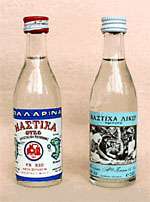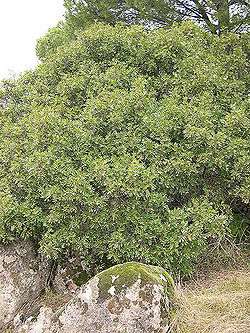Chios Mastiha
Chios Mastiha Liqueur (Greek: Μαστίχα Χίου, Greek pronunciation: [masˈtixa ˈçi.u]) is a liqueur flavoured with mastic distillate or mastic oil from the island of Chios. The name Chios Mastiha has protected designation of origin status in the European Union.[1] Chios Mastiha liqueur is served cold and has a crystal clear colour and a sweet aroma.
 Chios Mastiha Liqueur (right) and Mastika (left) | |
| Type | liqueur |
|---|---|
| Country of origin | Greece |
| Region of origin | Chios |
| Alcohol by volume | >15% |
| Colour | transparent crystal clear to yellowish |
| Flavour | mastic |
| Ingredients | water, alcohol, sugar, mastic |

Production
The process is regulated by Greek law and includes the flavouring of alcohol with mastic oil by agitation or the distillation of mastic with alcohol. The solution is then diluted with water and sweetened with sugar. The final alcoholic strength by volume of Chios Mastiha must be at least 15%.
Flavouring
The only flavouring agents used in Chios Mastiha liqueur are an alcoholic distillate of mastic or mastic oil made from Chios mastic. Mastic is the hardened sap harvested from the mastic tree, Pistacia lentiscus var chia, a small evergreen shrub that grows on rocky terrain on the southern part of the island. Chios mastic is certified by the Agricultural Products Certification and Supervision Organization as part of the Hellenic Ministry of Rural Development and Food.[2] The island's mastic production is controlled by a co-operative of medieval villages, the Mastichochoria.
Producers and distributors
Chios
- The Growers' Spirit is a producing company run by the Chios Gum Mastic Growers Association (CGMGA).[3] The CGMGA offers Mastiha liqueur made with both mastic distillate and mastic oil in two different variants: Kentos (20% alcohol) and Enosis (30% alcohol).
- Stoupakis Chios Distillery produces Homeric Mastiha, which contains mastic distillate.
Wider Greece
- Skinos, based in Athens.
- Finest Roots, based in Kalamata, produces Roots Mastic and Roots Mastic Vintage Strength.
- Mavrakis, based in Patra.
- D'ARGO Distillery, based in Athens, produces CHANDOLIA Mastic Liqueur by 100% Distillate
United States
- Mastrogiannis Mastiha
- Ambrosia Group, based in Miami, produces FOS Greek Mastiha.[4]
- YA Mastiha
History
Mastic has been harvested for at least 2,500 years since Greek Antiquity. The first mention of actual mastic 'tears' was by Hippocrates. Hippocrates used mastic for the prevention of digestive problems, colds and as a breath freshener. Roman emperors used mastic along with honey, pepper, and egg in the spiced wine conditum paradoxum. Digestive liqueurs, similar to Mastiha but made with grapes, were known as the Greek elixirs before the French Revolution.
See also
References
- "Masticha Chiou". Database of Origin and Registration. European Commission Agriculture and Rural Development. Retrieved 29 August 2017.
- "Inspection and Certification of PDO and PGI Products". Agrocert. Hellenic Agricultural Organization. Retrieved 29 August 2017.
- "The Growers' Spirit in the UK". Mastiha World.
- Doss, Laine. "Fos Greek Mastiha: Go Greek at the Setai". Miami New Times. Miami New Times, LLC. Retrieved 29 August 2017.